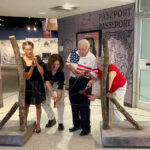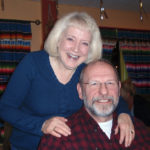One month ago in this diocese, Sheryl Olitzky and Atiya Aftab received the Pacem in Terris Peace and Freedom Award as co-founders of an international movement that builds relationships between Muslim and Jewish women. Meeting in small groups, members of the Sisterhood of Salaam Shalom get to know each other, which positively affects their views of each other’s communities. “Atiya and I believe, just as our respective traditions teach, that if we can change one person, we can also change the world,” Sheryl said in her acceptance speech Sept. 13 at St. Ambrose University in Davenport.
This approach is essential to breaking the escalating cycle of violence that has plagued Israel and Gaza for decades, a conflict that on Oct. 7 provoked a war and led to a still-unfolding humanitarian crisis. A statement that the Sisterhood of Salaam Shalom has released provides a compassionate response and some concrete actions for moving forward. Here is an excerpt:
“As a Sisterhood of Jewish and Muslim women, we hold multiple truths at any given moment. It is possible for us to acknowledge that murdering civilians is a war crime and firing missiles at civilians is also a war crime. It is possible for us to pray for the safe release of the 150 Israeli captives and pray for the safety of the besieged people of Gaza. It is possible for us to recognize that Palestinians are not Hamas and Israeli citizens are not their government. It is possible for us to grieve for our own dead and grieve for all those lost in this horrible cycle of violence. And be reminded that violence will always be met with more violence.”
“At this time, we have to choose compassion, which literally means suffering together and wishing to alleviate suffering. We must have compassion for all those who lost their family members, those who are in captivity and those seeking shelter from heavy artillery. Equally important is the feeling of compassion for each other and for our own tears, shock, pain, and fears. We truly are all suffering together at this moment. This is what it means to be human. This is what it means to possess moral clarity” (Sisterhood of Salaam Shalom statement by Tahija Vikalo, executive director, and Roberta Elliott, board president).
Michael McRay, a university lecturer on Israeli-Palestinian conflict and the author of “I Am Not Your Enemy,” shares additional insights to keep in mind:
- The importance of nuance. McRay says one of the first casualties of conflict is nuance. “When fear and anger get activated, it is natural to locate the threat and put all our energy into eliminating it.” However, “We simply must be able to both condemn Hamas’ murders and the kidnapping of Israeli families and civilians, and at the exact same time demand with clear conviction that Israel end its mission to destroy Gaza, cease killing Palestinian civilians, and dismantle its longstanding … occupation of Palestine.”
- Conflict resolution. McRay identifies these three important steps: proximity, humility and curiosity. “We have to shorten the distance between ourselves and what we’re in conflict with. We have to be open to the possibility that we might be wrong about what we have believed about the other. We have to cultivate enough curiosity to ask questions so we can learn. Few practices are more powerful in resolving conflict than empathy and commitment to examine our own role in the conflict.”
These insights from the Sisterhood of Salaam Shalom and McRay can assist us, as people of faith thousands of miles away from the conflict, in our relationships with people in our communities who have ties to Israel and Palestine. It is an opportunity to visit a synagogue and mosque in our region and to learn more about the history of relations between Israel and Palestine from respected news sources, such as OSV, which provides coverage for The Catholic Messenger. It is an opportunity to contact our congressional delegation (congress.gov) to ensure that our nation’s relationship with Israel ensures the well-being of the Palestinians.
Consider, also, a donation to Catholic Relief Services (CRS), which carries out the commitment of the U.S. bishops to assist the poor and vulnerable overseas. Donate online (support.crs.org/donate/holy-land-conflict) or by phone (1-877-HELP-CRS) or by check: Catholic Relief Services, Holy Land Response, PO Box 5200, Harlan, IA 51593-0700.
Finally, we must practice the work of peace in our own communities and churches. We can’t break the cycle of violence elsewhere in the world until we extinguish it here at home. It is time for us to reach out to the person whose motives we question or whose position is opposite of ours. It is time for us not to grow weary of praying for peace in the Holy Land and at home.
Barb Arland-Fye, Editor
arland-fye@davenportdiocese.org












